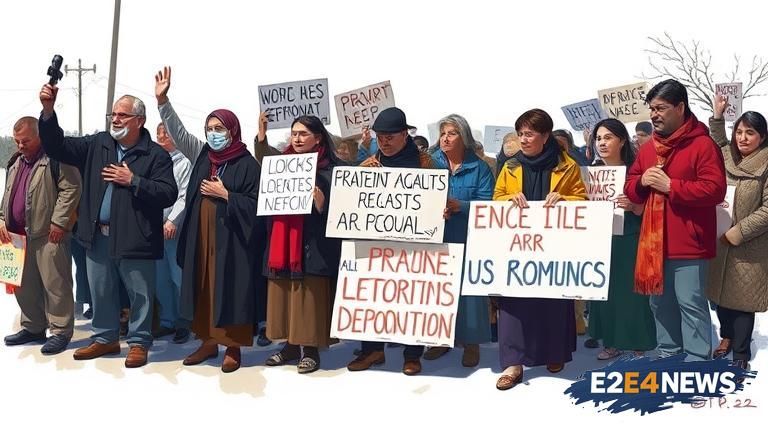A group of women faith leaders recently gathered outside the Los Angeles detention center to protest the ongoing issue of mass deportations. The protest, which was held in the form of a prayer vigil, aimed to raise awareness about the plight of immigrant families and individuals who are facing deportation. The faith leaders, who came from various religious backgrounds, emphasized the importance of compassion, empathy, and understanding in addressing the complex issue of immigration. They argued that mass deportations are not only inhumane but also go against the principles of justice, equality, and human rights. The protest was organized by a coalition of faith-based organizations, which have been working tirelessly to support immigrant communities and advocate for policy changes. The faith leaders expressed their deep concern about the trauma and suffering that deportations inflict on families, particularly children, and the long-term effects it has on their mental and emotional well-being. They also highlighted the economic and social contributions that immigrants make to the country, and the need to recognize their dignity and worth. The prayer vigil was attended by dozens of people, including community members, activists, and family members of those who are facing deportation. The event featured speeches, prayers, and testimonials from individuals who have been directly affected by deportations. The faith leaders called on the government to adopt a more humane and compassionate approach to immigration, one that prioritizes family unity, dignity, and human rights. They also urged the public to get involved in the issue, to educate themselves about the complexities of immigration, and to support organizations that are working to protect the rights of immigrants. The protest was part of a larger movement that is sweeping the nation, as faith leaders and communities are coming together to demand justice and compassion for immigrant families. The issue of mass deportations has sparked a heated debate across the country, with many arguing that it is a moral and ethical imperative to protect the rights and dignity of all individuals, regardless of their immigration status. The faith leaders emphasized that their protest was not just about politics, but about people, and the need to put human faces to the statistics and policies that often dominate the conversation around immigration. They argued that the current system is broken, and that a new approach is needed, one that prioritizes the well-being and safety of all individuals, regardless of their background or immigration status. The protest was also seen as a call to action, urging people to get involved in the issue, to contact their elected officials, and to support organizations that are working to protect the rights of immigrants. The faith leaders expressed their commitment to continuing their advocacy work, and to supporting immigrant communities in their struggle for justice and dignity. They also emphasized the importance of building bridges, rather than walls, and of fostering a sense of community and belonging that includes all individuals, regardless of their immigration status. The issue of mass deportations is complex, and it requires a nuanced and multifaceted approach, one that takes into account the economic, social, and humanitarian implications of such policies. The faith leaders argued that the current approach is not only inhumane but also ineffective, and that a new strategy is needed, one that prioritizes the well-being and safety of all individuals, and that recognizes the dignity and worth of every human being. The protest was a powerful reminder of the importance of faith and activism in bringing about social change, and of the need for people of conscience to come together to demand justice and compassion for all individuals, regardless of their background or immigration status.





